初一英语(下)知识点
人教版七年级英语下册各知识点归纳总结
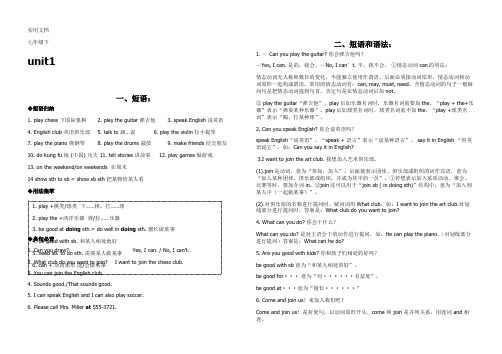
七年级下unit1一、短语:◆短语归纳1. play chess 下国际象棋2. play the guitar 弹吉他3. speak English 说英语4. English club 英语俱乐部5. talk to 跟…说6. play the violin 拉小提琴7. play the piano 弹钢琴8. play the drums 敲鼓9. make friends 结交朋友10. do kung fu 练 (中国) 功夫 11. tell stories 讲故事 12. play games 做游戏13. on the weekend/on weekends 在周末14 show sth to sb = show sb sth 把某物给某人看◆用法集萃◆典句必背1. Can you draw? Yes, I can. / No, I can’t.2. What club do you want to join? I want to join the chess club.3. You can join the English club.4. Sounds good./That sounds good.5. I can speak English and I can also play soccer.6. Please call Mrs. Miller at 555-3721.二、短语和语法:1. — Can you play the guitar? 你会弹吉他吗?—Yes, I can. 是的,我会。
—No, I can’t. 不,我不会。
①情态动词can的用法:情态动词无人称和数目的变化,不能独立使用作谓语,后面必须接动词原形,情态动词和动词原形一起构成谓语。
常用的情态动词有:can, may, must, need。
含情态动词的句子一般疑问句是把情态动词提到句首,否定句是在情态动词后加not。
初一英语下册知识点归纳与总结
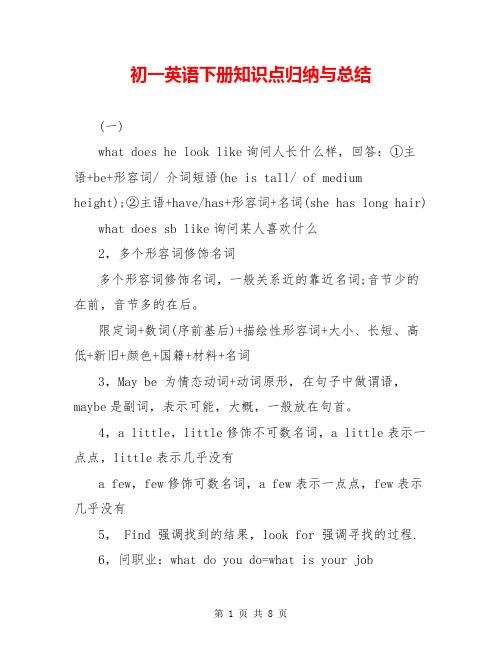
初一英语下册知识点归纳与总结(一)what does he look like询问人长什么样,回答:①主语+be+形容词/ 介词短语(he is tall/ of medium height);②主语+have/has+形容词+名词(she has long hair) what does sb like询问某人喜欢什么2,多个形容词修饰名词多个形容词修饰名词,一般关系近的靠近名词;音节少的在前,音节多的在后。
限定词+数词(序前基后)+描绘性形容词+大小、长短、高低+新旧+颜色+国籍+材料+名词3,May be 为情态动词+动词原形,在句子中做谓语,maybe是副词,表示可能,大概,一般放在句首。
4,a little,little修饰不可数名词,a little表示一点点,little表示几乎没有a few,few修饰可数名词,a few表示一点点,few表示几乎没有5, Find 强调找到的结果,look for 强调寻找的过程.6,问职业:what do you do=what is your job7,the same asbe different8,long straight brown hair9,最后in the end(表事情结局)finally(强调次序)at last(强调经多番努力终于达成)By the end of 直到为止At the end of在末端/尽头(二)1,名词可分为可数名词和不可数名词(不可数名词作主语,谓语动词用单数)。
可数名词又分单数和复数。
1一般+s;2以-s,-x,-ch,sh结尾的名词+es;3辅音+y,把y变i,再+es;4以-o结尾的,有生命的+es(negronegroes;heroheroes;tomatotomatoes;potatopotat oes);无生命的+s;⑤以f,fe 结尾的名词,改f,fe为v+es(leafleaves;knifeknives)(例外:roofs,chiefs)⑥单复数同形:sheep,deer.不规则变化:manmen;womanwomen;childchildren;footfeet;toothteeth等2,would like sth. 想要某物Would you like some 你想要一些吗 Yes, please./ No, thanks.would like to do sth. 想要做某事。
七年级下册英语各单元知识点归纳

七年级下册英语各单元知识点归纳七年级下册英语共有八个单元,包括Unit 1 Making a difference, Unit 2 Great people, Unit 3 Travel journal, Unit 4 Our world, Unit 5 Sharing, Unit 6 Animal world, Unit 7 Science and technology, Unit 8 Sports and health。
下面对每个单元的知识点进行归纳。
Unit 1 Making a difference:1. 基本动词的用法(is/am/are, have/has, do/does)2. 熟练掌握一般现在时的肯定句、否定句和疑问句的构造3. 可数名词和不可数名词的用法及其与冠词的搭配4. 形容词的基本用法5. 过去式动词的构成6. 宾语从句的引导词that的用法Unit 2 Great people:1. 一般过去时的肯定句、否定句和疑问句的构造2. 练习几个表示过去经历的词组和短语,如was/were, went to, saw, met, had等3. 表示习惯的副词 and used to的用法4. 形容词的最高级的构造及用法5. 练习几个形容词的比较级的构成及用法,如big-bigger, good-better, etc.6. 表示过去的时间状语的用法,如in 1998, last week, etc.Unit 3 Travel journal:1. 用there be句型描述地理位置,如There is a park in the town.第1页/共4页2. 学习有关城市、国家和世界各地的基本名称和信息,如countries, continents, cities, etc.3. 学习询问和描述位置的常用句型,如Where is...? It's in/on...4. 学习询问和描述交通方式的常用句型,如How do you go to...? I go by...5. 学习描述天气的常用句型,如What's the weather like? It'ssunny/cloudy/windy, etc.6. 学习描述食物的常用句型,如What do you want to eat? I want to eat...7. 学习描述节日和活动的常用句型,如Is there a...? Yes, thereis./No, there isn't.Unit 4 Our world:1. 学习地点介词的基本用法,如in, on, at等2. 学习描述日常活动的句型,如I get up at 7:00. He goes to school by bike, etc.3. 学习询问和描述时间的句型,如What time do you...? I... at...4. 学习表示频率的副词的用法,如always, usually, often, sometimes, never等5. 学习询问和描述日程安排的句型,如What's your plan for...? My plan is to...6. 练习定语从句的引导词和用法,如who, which, where, when等Unit 5 Sharing:1. 学习权限动词can的用法,表示能力、许可和请求2. 学习询问和描述个人能力的句型,如Can you...? I can...3. 学习谈论和分享个人喜好和兴趣的句型,如I like... I'minterested in...4. 学习询问和描述物品的价钱的句型,如How much is/are...? It's... They're...5. 学习询问和描述购物需求的句型,如What do you want? I want...6. 学习名词性物主代词的用法,如mine, yours, his, hers, etc.7. 学习问路和指示方向的句型,如Excuse me, where is...? It's on the left/right.Unit 6 Animal world:1. 学习动物的基本名称,如lion, penguin, tiger, elephant, etc.2. 学习描述动物外貌和特征的形容词,如big, small, tall, short, etc.3. 学习描述动物习性和动作的动词,如eat, run, swim, fly, etc.4. 学习用there is/are句型描述动物的句型,如There is a lion in the zoo.5. 学习询问和描述动物数量的句型,如How many... are there? There are...6. 学习询问和描述动物食物的句型,如What do... eat? They eat...7. 学习常见的动物园动物和其所属的科,如mammals, birds, reptiles, etc.8. 学习描述动物习性和栖息地的句型,如Lions live in Africa. They sleep in the daytime.Unit 7 Science and technology:1. 学习描述科技产品和设备的基本词汇,如mobile phone, computer, TV, etc.2. 学习询问和描述使用科技产品的方式的句型,如How do you...? I... with...3. 学习科技产品的功能和用途的句型,如What can it do? It can...4. 学习询问和描述科技产品的方便之处和不方便之处的句型,如Is it...? Yes, it is./No, it isn't.第3页/共4页5. 学习描述科技产品的发展和创新的句型,如In the past, people... Now, they...Unit 8 Sports and health:1. 学习描述运动和活动的基本词汇,如play basketball, swim, run, dance, etc.2. 学习询问和描述运动和活动的频率的句型,如How often do you...?I... every...3. 学习询问和描述运动的喜好的句型,如What sports do you like? I like...4. 学习询问和描述身体健康状况的句型,如How are you? I'm (I)have a headache, etc.5. 学习描述饮食习惯和作息时间的句型,如I usually... I go to bed at...6. 学习询问和描述健康建议的句型,如What should I do? You should...7. 学习询问和描述身体部位和病痛的句型,如What's wrong with you?I have a sore throat.以上是七年级下册英语各单元的知识点归纳,希望对你有帮助!。
七下英语语法知识点归纳总结

七下英语语法知识点归纳总结以下是七下英语的部分语法知识点:1. 现在进行时定义:表示正在进行的动作或存在的状态。
结构:be (am/is/are) + 动词的现在分词。
动词现在分词形式:动词+ing,例如:playing, singing, 写作:writing。
用法:描述真实情境中的动作,例如“他正在看书”。
2. 动词不定式定义:动词不定式是非谓语动词的一种形式,表示不定或未来的动作。
结构:to + 动词原形,例如:to play, to go。
用法:作为目的状语、作为后置定语等。
3. 形容词的比较级和最高级定义:形容词的比较级表示“更……”,最高级表示“最……”。
结构:比较级:形容词+er,最高级:形容词+est。
用法:描述物品的大小、重量、长度等属性的比较,例如“这个苹果比那个大”。
4. 情态动词定义:情态动词是一种表示可能性、必要性的助动词。
结构:can, could, may, might, must等。
用法:表示可能性,例如“他可能在这儿”;表示必要性,例如“你必须快点儿”。
5. 一般将来时定义:表示未来的动作或状态。
结构:will + 动词原形,例如:will go, will be。
用法:描述未来的计划、安排等,例如“明天我将要去公园”。
6. 一般现在时定义:表示现在的动作或状态。
结构:动词原形,第三人称单数形式为动词+s/es。
用法:描述日常习惯、事实等,例如“我每天早上跑步”。
7. 现在完成时定义:表示过去的动作对现在的影响或过去的动作持续到现在。
结构:have/has + 过去分词。
用法:描述已经完成的动作或状态,例如“我已经完成了作业”。
8. 时间介词和连词表示时间的介词:at, on, in;before, after;since等。
表示时间的连词:when, while等。
用法:描述时间关系,例如“我在上学的时候去了北京”。
9. 宾语从句和定语从句宾语从句:放在动词或介词后面的句子,充当宾语。
七年级下册英语单元知识点总结道客

七年级下册英语单元知识点总结道客道客七年级下册英语单元知识点总结七年级下册英语单元知识点总结英语学习是我们初中学习的重要一环,对于初中七年级下册英语单元知识点的掌握,不仅能够帮助我们更好地理解课文,还能够提高我们的英语语言能力。
下面是对七年级下册英语单元知识点的总结,希望对同学们的学习有所帮助。
Unit 1: Greetings and Introductions这个单元主要是学习问候和介绍的表达方式。
学习如何问候他人,如何介绍自己和他人的基本信息。
同时,还学习了一些关于国家和国籍的词汇。
Unit 2: School Life这个单元主要是学习关于学校生活的表达方式。
学习如何表达自己的课程安排,学习如何询问他人的学习情况。
同时,还学习了一些学校设施和学习用品的词汇。
Unit 3: Hobbies这个单元主要是学习关于爱好的表达方式。
学习如何表达自己的爱好,学习如何询问他人的爱好。
同时,还学习了一些关于运动、音乐和艺术的词汇。
Unit 4: Family and Friends这个单元主要是学习关于家庭和朋友的表达方式。
学习如何介绍自己的家庭和朋友,学习如何询问他人的家庭和朋友。
同时,还学习了一些家庭成员和人际关系的词汇。
Unit 5: Food and Drinks这个单元主要是学习关于食物和饮料的表达方式。
学习如何点餐和询问他人的饮食习惯。
同时,还学习了一些关于食物和饮料的词汇。
Unit 6: Health and Body这个单元主要是学习关于健康和身体的表达方式。
学习如何描述自己和他人的健康状况,学习如何询问他人的健康状况。
同时,还学习了一些关于身体部位和常见疾病的词汇。
Unit 7: Clothes and Weather这个单元主要是学习关于服装和天气的表达方式。
学习如何描述自己和他人的服装,学习如何询问他人的服装和天气情况。
同时,还学习了一些关于服装和天气的词汇。
Unit 8: Shopping这个单元主要是学习关于购物的表达方式。
人教版七年级英语下册单元知识点总结(全册)
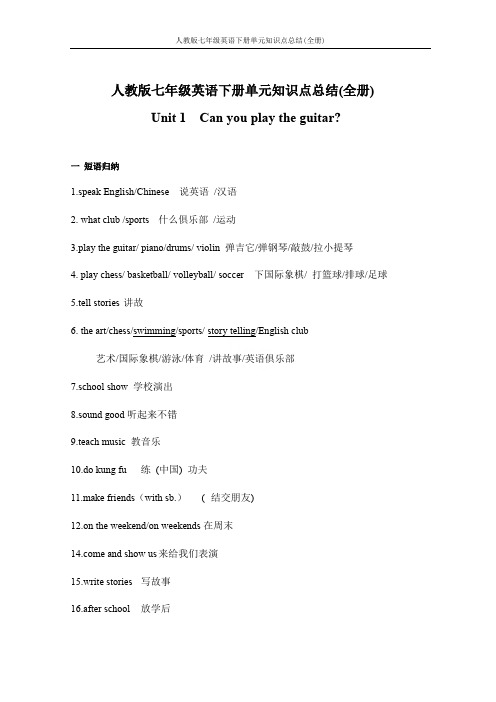
人教版七年级英语下册单元知识点总结(全册)Unit 1 Can you play the guitar?一短语归纳1.speak English/Chinese 说英语/汉语2. what club /sports什么俱乐部/运动3.play the guitar/ piano/drums/ violin 弹吉它/弹钢琴/敲鼓/拉小提琴4. play chess/ basketball/ volleyball/ soccer 下国际象棋/ 打篮球/排球/足球5.tell stories讲故6. the art/chess/swimming/sports/ story telling/English club艺术/国际象棋/游泳/体育/讲故事/英语俱乐部7.school show 学校演出8.sound good听起来不错9.teach music 教音乐10.do kung fu练(中国) 功夫11.make friends(with sb.)(结交朋友)12.on the weekend/on weekends在周末e and show us来给我们表演15.write stories写故事16.after school放学后17.English-speaking students说英语的学生18.play games 做游戏19.the Students’ Sports Center学生运动中心20.at the old people’s home在老人之家21.be in our school music festival 参加学校音乐节22.jion the music club加入音乐俱乐部二用法集萃1. play +棋类/球类下……棋,打……球2. play the +乐器弹/拉……乐器3. be good at doing sth.擅长做某事be good for.. 对… 有好处be good /kind to … 对… 友好4. be good with sb. 和某人相处地好; 善于应付(处理)…5. need(sb./sth.)to do… 需要(某人/某物)做….6. can + 动词原形能/会做某事7. a little + 不可数名词: 一点儿……9. like to do sth.或like doing sth. 喜欢做某事10.want to do…想做……11.What about…?…怎么样?(后面接Ving/代词/名词)12. talk用法: talk to/with sb. 跟某人说话talk about sth. 谈论某事tell 用法:tell sb sth. 告诉某人某事tell sb to do sth 告诉某人去做某事tell stories 讲故事say用法:say直接加说话的内容/itspeak用法:speak +语言13.help sb. with sth在某方面帮助某人= help sb.(to)do sth14.be free /busy有空/很忙15. call sb. at+号码拨打某人的……号码16. be in=join …成为…中的一员(P6)17.want …for the school show为学校表演招聘……三典句必背1. Can you draw? 你会画画吗?Yes, I can. / No, I can’t.是,我会。
初一下册英语知识点汇总

初一下册英语知识点汇总一、语法知识点1. 现在进行时:描述正在进行的动作或状态,使用时用be动词加动词-ing形式。
例:I am reading a book.(我正在读一本书。
)2. 一般现在时:表示经常性或普遍性的动作或状态。
例:She goes to school every day.(她每天上学。
)3. 一般过去时:表示过去发生的动作或状态。
例:They visited their grandparents last week.(他们上周去看望了他们的祖父母。
)4. 一般将来时:表示将要发生的动作或状态。
例:We will have a party tomorrow.(我们明天要开一个派对。
)二、词汇知识点1. 问候语:用于问候和打招呼的常用表达。
例:Hello!(你好!)Nice to meet you!(很高兴见到你!)2. 数字:用于表示数量或顺序的数字词汇。
例:one(一), two(二), three(三), first(第一), second (第二), third(第三)3. 学科词汇:常用于描述科目和研究相关的单词。
例:math(数学), science(科学), geography(地理), history(历史)4. 动词:常用动作动词和状态动词。
例:run(跑), eat(吃), sleep(睡觉), happy(快乐)三、阅读技巧1. 理解词义:通过上下文推测词义,遇到生词时可以使用词根或词缀分析词义。
2. 关键词定位:快速浏览文章,找到与问题相关的关键词,通过定位关键词来找到答案。
3. 推理推断:从已有信息中推断答案,根据事实进行逻辑推理。
4. 主旨概括:准确理解文章的主旨,通过理解文章大意来回答问题。
四、听力技巧1. 注意听力材料:集中注意力,注意材料中的关键词和信息。
2. 笔记记录:听力过程中可以适当做笔记,帮助记忆和理解。
3. 推断答案:通过听到的信息和已有知识推断答案。
人教版初一英语下册知识点

人教版初一英语下册知识点
以下是初一英语下册部分重点知识点:
1. 一般现在时:表示经常或习惯性的动作或状态,常与always, usually, often, sometimes, every day 等时间状语连用。
2. 现在进行时:表示现在正在进行的动作或状态,常与now, at the moment, Look! Listen! 等时间状语连用。
3. 一般过去时:表示过去某个时间发生的动作或状态,常与yesterday, last week, in 2000 等时间状语连用。
4. 祈使句:用于表达请求、命令、建议或劝告等,通常以动词原形开头,句末用句号或感叹号。
5. There be 句型:表示“某地有某物”,其中be 动词的形式根据主语的单复数形式而定。
6. 形容词和副词的比较级和最高级:用于比较两个或两个以上的人或事物,比较级用于两者之间的比较,最高级用于三者或三者以上的比较。
7. 情态动词:表示能力、可能性、请求、建议、许可等,如can, could, may, might, must, have to 等。
初一下课英语知识点
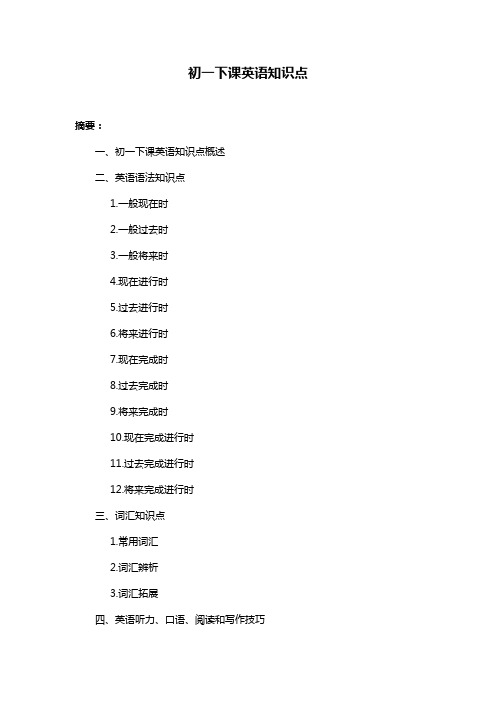
初一下课英语知识点摘要:一、初一下课英语知识点概述二、英语语法知识点1.一般现在时2.一般过去时3.一般将来时4.现在进行时5.过去进行时6.将来进行时7.现在完成时8.过去完成时9.将来完成时10.现在完成进行时11.过去完成进行时12.将来完成进行时三、词汇知识点1.常用词汇2.词汇辨析3.词汇拓展四、英语听力、口语、阅读和写作技巧1.听力技巧2.口语技巧3.阅读技巧4.写作技巧五、初一下课英语知识点总结与建议正文:初一下课英语知识点涵盖了英语语法、词汇、听力、口语、阅读和写作等方面。
以下将详细介绍这些知识点,以帮助同学们更好地掌握初一英语课程。
一、英语语法知识点1.一般现在时:表示现在的习惯、状态、事实等。
如:I study English every day.2.一般过去时:表示过去某个时间发生的动作或存在的状态。
如:He studied English yesterday.3.一般将来时:表示将来某个时间会发生的动作或存在的状态。
如:He will study English tomorrow.4.现在进行时:表示现在正在进行的动作。
如:He is studying English.5.过去进行时:表示过去某个时间正在进行的动作。
如:He was studying English at 8 o"clock yesterday.6.将来进行时:表示将来某个时间将要进行的动作。
如:He will be studying English at 8 o"clock tomorrow.7.现在完成时:表示过去发生的动作对现在造成的影响或结果。
如:He has studied English.8.过去完成时:表示过去某个时间之前已经完成的动作。
如:He had studied English before he went to school.9.将来完成时:表示将来某个时间之前将要完成的动作。
unit1 Can you play the guitar- 七年级英语下册同步必背知识清单(人教版

Unit 1 Can you play the guitar?七年级英语下册必备知识清单一、词汇知识清单I、课标词汇[注意英译汉]guitar [gɪ'tɑː] n.吉他sing [sɪŋ] v.唱;唱歌swim [swɪm] v.游泳dance [dɑːns] v.跳舞;舞蹈draw [drɔː] v.画chess [tʃes] n.国际象棋speak [spiːk] v.说;说话join [dʒɒɪn] v.参加;加入club [klʌb] n.俱乐部;社团tell [tel] v.&n.讲述;告诉story ['stɔːrɪ] n.故事;小说write [raɪt] v.写作,写字show [ʃəʊ] n.演出;表演v.展示or [ɔː] conj.或者talk [tɔːk] v.&n.说话;谈话kung fu [ˌkʌŋ'fu:] n.(中国)功夫drum [drʌm] n.鼓piano [pɪ'ænəʊ] n.钢琴violin [vaɪə'lɪn] n.小提琴also ['ɔːlsəʊ] adv.也;而且people ['piːp(ə)l] n.人;人们home [həʊm] n.家,活动本部. adv.到家,在家make [meɪk] v.使或为;制造today [tə'deɪ] adv.在今天center['sentə] n.(=centre)中心,中央weekend [wiːk'end] n.周末teach [tiːtʃ] v.教,讲授musician [mjuː'zɪʃ(ə)n] n.音乐家II、语法词汇知其变[注意词性变化]1.sing[sɪŋ] v.唱;唱歌---ing形式.singing---n.singer歌手2.swim [swɪm] v.游泳--- ing形式.swimming---n.swimmer游泳者3.dance [dɑːns] v.跳舞;舞蹈--- ing形式.dancing---n.dancer舞者4.draw [drɔː] v.画---ing形式.drawing---n.drawer抽屉5.speak [spiːk] v.说;说话---ing形式.speaking---n.speaker演讲者6.tell [tel] v.&n.讲述;告诉---ing形式.telling---n.teller讲述者7.story['stɔːrɪ] n.故事;小说---pl.stories8.write [raɪt] v.写作,写字---ing形式.writing---n.writer作者9.tell [tel] v.&n.讲述;告诉---ing形式. telling10.drum [drʌm] n.喇叭---pl.drums11.piano[pɪ'ænəʊ] n.钢琴---pl.pianos12.violin [vaɪə'lɪn] n.小提琴---pl.violins13.teach[tiːtʃ] v.教,讲授---3pl.teaches---ing形式.teaching---n.teacher教师14.musician[mjuː'zɪʃ(ə)n] n.音乐家---n.music音乐III、重点短语知搭配[注意固定短语的英汉互译]play chess下象棋speak English说英语play the guitar弹吉他join the music club加人音乐俱乐部be good at. 擅长于…like to draw喜欢画画talk to sb.跟……说话show us向我们展示一下tell stories讲故事write stories写故事swimming club游泳俱乐部art club美术俱乐部chess club国际象棋俱乐部English club英语俱乐部sports club运动俱乐部in the music room在音乐教室the story telling club讲故事俱乐部play the drums敲鼓play the piano弹钢琴play the violin拉小提琴after school放学以后help for old people为老年人提供帮助help with sports在运动方面提供帮助be good with...善于应付……的;对……有办法make friends交朋友help(sb.)with sth.在某方面帮助(某人)on the weekend (在)周末at the old people's home在敬老院里need sb. to do sth.需要某人做某事sing and dance载歌载舞play games with people和人们玩游戏tell sb. stories给某人讲故事the Students’ Sports Center学生运动中心be busy繁忙call...at+电话号码打电话号码找IV、核心单词知用法[注意固定短语、句型和词块]Section A1.-Can you swim? 你会游泳吗? -No, I can't.不,我不会。
七年级下英语知识点
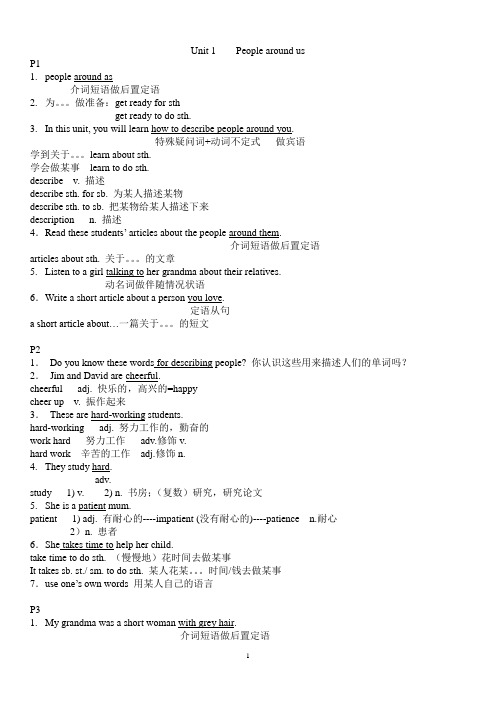
Unit 1 People around usP11.people around as介词短语做后置定语2.为。
做准备:get ready for sthget ready to do sth.3.In this unit, you will learn how to describe people around you.特殊疑问词+动词不定式做宾语学到关于。
learn about sth.学会做某事learn to do sth.describe v. 描述describe sth. for sb. 为某人描述某物describe sth. to sb. 把某物给某人描述下来description n. 描述4.Read these student s’ articles about the people around them.介词短语做后置定语articles about sth. 关于。
的文章5.Listen to a girl talking to her grandma about their relatives.动名词做伴随情况状语6.Write a short article about a person you love.定语从句a short article about…一篇关于。
的短文P21.Do you know these words for describing people? 你认识这些用来描述人们的单词吗?2.Jim and David are cheerful.cheerful adj. 快乐的,高兴的=happycheer up v. 振作起来3.These are hard-working students.hard-working adj. 努力工作的,勤奋的work hard 努力工作adv.修饰v.hard work 辛苦的工作adj.修饰n.4.They study hard.adv.study 1) v. 2) n. 书房;(复数)研究,研究论文5.She is a patient mum.patient 1) adj. 有耐心的----impatient (没有耐心的)----patience n.耐心2)n. 患者6.She takes time to help her child.take time to do sth. (慢慢地)花时间去做某事It takes sb. st./ sm. to do sth. 某人花某。
初一英语知识点(下册)
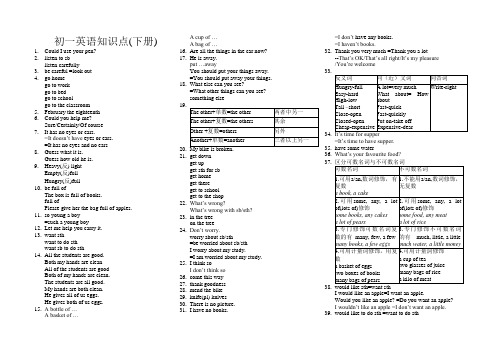
初一英语知识点(下册)1.Could I use your pen?2.listen to sblisten carefully3.be careful =look out4.go homego to workgo to bedgo to schoolgo to the classroom5.February the eighteenth6.Could you help me?Sure/Certainly/Of course7.It has no eyes or ears.=It doesn’t have eyes or ears.=It has no eyes and no ears8.Guess what it is.Guess how old he is.9.Heavy(反) lightEmpty(反)fullHungry(反)full10.be full ofThe box is full of books.full ofPlease give her the bag full of apples.11.so young a boy=such a young boy12.Let me help you carry it.13.want sthwant to do sthwant sb to do sth14.All the students are good.Both my hands are cleanAll of the students are goodBoth of my hands are clean.The students are all good.My hands are both clean.He gives all of us eggs.He gives both of us eggs.15.A bottle of …A basket of …A cup of …A bag of …16.Are all the things in the car now?17.He is away.put …awayYou should put your things away.=You should put away your things.18.What else can you see?=What other things can you see?something else19.20.21.get downget upget sth for sbget homeget thereget to schoolget to the shop22.What’s wrong?What’s wrong with sb/sth?23.in the treeon the tree24.Don’t worry.worry about sb/sth=be worried about sb/sthI worry about my study.=I am worried about my study.25.I think soI don’t think soe this way27.thank goodness28.mend the bike29.knife(pl) knives30.There is no picture.31.I have no books.=I don’t have any books.=I haven’t books.32.Thank you very much =Thank you a lot--That’s OK/That’s all right/It’s my pleasure/You’re welcome33.34.=It’s time to have supper.35.have some water36.What’s your favourite food?37.38.I would like an apple=I want an apple.Would you like an apple? =Do you want an apple?I wouldn’t like an apple =I don’t want an apple.39.would like to do sth =want to do sthI’d like to go home. =I want to go home.40.What would you like?41.something to drinksomething to eatsomething to playnothing to eat42.a piece of43.have some/much/no time to do sthI have no time to go home for lunch.44.have sports =do sport45.be good at sth=do well in sthbe good at doing sth =do well in doing sth 46.play basketballplay footballplay volleyball47.pass sth to sb =pass sb sthI pass a book to him. =I pass him a book.pass sth on to sb =pass on sth to sb48.Let me trytry sth on =try on sthtry to do sth49.want a go50.throw sth away51.fly a kite52.Throw it like this.Don’t throw it like that.53.54.55.basketball player56.on the school football team57.every dayevery Fridayevery Friday morning58.59.60.read a bookwatch TVwatch a football matchlook at the blackboardsee a filmsee a doctor61.draw a picture62.talk with sb63.open the door64.take photos65.66.67.go shopping68.at this time of day69.–What day is it today?-It’s Monday.70.–What’s the time? –It’s ten.-What time is it? –It’s ten.71.It’s open 24 hours.72.an English-Chinese dictionary73.give sth back to sbgive back sth to sbI give some money back to her=I give back some money to her.74.next Monday75.give sb a hand =help sbCan you give me a hand?=Can you help me?76.in the evening =at night77.May I speak to Jim? =Speaking78.There’s something wrong with the bike.There’s nothing wrong with the kite.=There isn’t anything wrong with the kite79.after classafter school80.help sb with sthhelp sb do sthhelp sb to do sth81.have a (good) rest82.It takes sb some time to do sthIt takes me an hour to do my homework.It takes time.83.I use a bike to go to school.=I go to school by bikeI use a knife to cut a cake.=I cut a cake with a knife84.at No. 14 Middle School85.have sth to do86.on Mondayon Tuesday morningon Wednesday afternoonon the night of Thursdayin the morning87.Can I get you something to drink?=Can I get something to drink for you?88.have a big breakfast89.three or four eggs90.That’s all.Is that all?91.worry about sb/sthbe worried about sb/sthDon’t worry about him.=Don’t be worried about him.92.How big is it?-It’s about this big.93.It looks very much like yours.He looks very much like his father.94.What does that say?-It says “closed”.95.learn sth from sbHe learns English from me.96.bring sth back97.98.99.have a meeting100.have something to do101.There is no difference.102.be friendly to sb103.have a good time=play happily104.Let’s be good friends.105.No smokingNo photosNo parking106.leave for school =go to school107.the map of the world108.How do you like China?=What do you think of China?-Very much109.What do you like about China?-The people and the food 110.Do you speak Chinese?-Yes, but only a little 111.the Great Wall 112.follow me 113.family namegiven name114.teach me Englishteach sb to do sth 115.stay herestay at home116.Here is a postcard from Lily to a friend in the USA 117.five days a weekgo out120.ask sb to do sthI ask them to have dinnerthey ask us to go to their homes for dinner. 121.write to sb 122.make friendsmake friends with sb 123.Jim is twelve.=Jim is twelve years old.=Jim’s age is twelve.=Jim is a twelve-year-old boy 124.all kinds ofdifferent kinds of126.morning meal =breakfastevening meal =supper 127.Do you like rice?Yes, I do. I like it a little.I like it very much(a lot). No, I don’t. I don’t like it at all. 128.have sth for breakfasteat sth for lunch129.Why don’t you go to the toy shop?=Why not go to the toy shop? 130.do the housework131.make phone calls to sbmake a phone call to sb give sb a call give a call to sb call sbtelephone sb 132.do some cookingdo some washing do some shopping do some cleaning 133.What else can I do?=What other things can I do?134.What does he do? =What is he? =What’s his job?What do you do?=What are you? =What’s your job? 135.Where does he work? 136.I want to be a writer.What do you want to be? 137.take turnsIt’s one’s turn to do sth 138.Nice to meet you.=Nice meeting you. 139.have a party140.Chinese medicine 141.in the day 142.make moneymake much money 143.at weekendon weekdays144.love to work for sb145.English books on Chinese medicineabout 146.When do you get up? 147.Class beginsClasses begin. Class is over. 148.right now149.wash one’s face 150.get homeget to school get to the shop 151.go shoppinggo swimming go fishing go boating152.I ride a bike to school.=I go to school on my bike. =I go to school by bike 153.on the playground 154.No news is good news.155.There is a bridge over the river. 156.in the sky157.How long does it take you to do your homework? 158.too much moneytoo many apples You eat too much.159.Don’t you usually come to school by bike?Yes, I do.160.Isn’t the sun bigger than the moon?-Yes, it is161.Walking is goodIs listening to music bad? No, it isn’t.162.It’s a fine day for walkingIt’s a fine day for a walk.163.The air today is nice and clean.The air today is very clean. 164.A is far (away) from BA is 5Km (away) from Bfar 与具体路程不能同时出现在一个句子当中 My home is far away.My home is 5Km from school.How far…?How far is your home from school?165.It’s about 10 minutes by bike.It’s about 20 minutes on foot.=It’s about 20 minutes’ walk.166.be late for school/ class/ work/ meeting167.stay in bedread in bed168.at the right time169.with tears in his eyesThe teacher comes in with books in his hand. 170.buy sth for sbbuy sb sth171.修饰不可数名词修饰可数名词A little肯定,一点儿 A few肯定,一些Little否定,几乎没有Few否定,几乎没有172.a kilo of applestwo kilos of meathalf a kilo of milk173.What things does it sell?174.twenty yuan a bagten yuan a kilofive yuan a bottle175.How much is the book?How much are the eggs?How much is the meat?176.May I help you?=Can I help you?=What can I do for you?-Yes, please/ No, thanks177.Here’s the money.178.Reading in bed is bad for eyes.179.How much is the pen?=What’s the price of the pen?180.No pains, no gains.日常交际用语简表(Daily Expressions in Communication)1. 问候Greetingsa. Good morning / afternoon / evening.Hello / Hi.How are you?b. Fine, thank you. And you?V ery well, thank you.2. 介绍Introductionsa. This is Mr / Miss / Mrs....b. How do you do?Nice / Glad to see / meet you.c. My name is...I'm a student / worker etc. (here).3. 告别Farewellsa. I think it s time for us to leave now.b. Goodbye! (Bye-bye! Bye!)See you later / tomorrow. (See you.)Good night.4. 打电话Making telephone callsa. Hello! May I speak to...?b. Hold on, please.He / She isn't here right now.Can I take a message for you?c. I'm calling to tell / ask you....d. Goodbye.5. 感谢和应答Thanks and responsesa. Thank you (very much).Thanks a lot.Many thanks.Thanks for....b. Not at all.That's all right.You're welcome.6. 祝愿、祝贺和应答Wishes, congratulations and responsesa. Good luck!Best wishes to you.Have a nice / good time.Congratulations!b. Thank you.c. Happy New Year!Merry Christmas!Happy birthday to you.d. The same to you.7. 意愿IntentionsI'm going to....I will....I'd like to....I want / hope to....8. 道歉和应答Apologies and responsesa. I'm sorry. (Sorry.)I'm sorry for / about....Excuse me.b. That's all right.It doesn't matter.That's nothing.9. 遗憾和同情Regrets and sympathyWhat a pity!I m sorry to hear....10. 邀请和应答Invitations and responsesa. Will you come to...?Would you like to...?b. Yes, I'd love to....Yes, it's very kind / nice of you.c. I'd love to, but....11. 提供(帮助等)和应答Offers and responsesa. Can I help you?What can I do for you?Here, take this / my....Let me...for you.Would you like some...?b. Thanks. That would be nice / fine.Thank you for your help.Yes, please.c. No, thanks / thank you.That's very kind of you, but....12. 请求允许和应答Asking for permission and responsesa. May I...?Can / Could I...?b. Yes / Certainly.Yes, do please.Of course (you may).That's OK / all right.c. I'm sorry, but....You'd better not.13. 表示同意和不同意Expressing agreement and disagreementa. Certainly / Sure / Of course.Yes, please.Yes, I think so.That's true.All right / OK.That's a good idea.I agree (with you).b. No, I don't think so.I'm afraid not.I really can't agree with you.14. 表示肯定和不肯定Expressing certainty and uncertaintya. I'm sure.I'm sure (that)....b. I'm not sure.I'm not sure whether / if....c. Maybe / Perhaps.15. 喜好和厌恶Likes and dislikesa. I like / love...(very much).I like / love to....b. I don't like (to)....I hate (to)....16. 谈论天气Talking about the weathera. What's the weather like today?How's the weather in...?b. It's fine / cloudy / windy / rainy, etc.It's rather warm / cold / hot / etc. today, isn't it?17. 购物Shoppinga. What can I do for you?May / Can I help you?b. I want / I'd like....How much is it?That's too much / expensive, I'm afraid.That's fine. I'll take it.Let me have...kilo / box, etc.c. How many / much do you want?What colour / size / kind / do you want?d. Do you have any other kind / size / colour, ect. ?18. 问路和应答Asking the way and responsesa. Excuse me. Where's the men's / ladies' room?Excuse me, can you tell me the way to...?How can I get to...? I don't know the way.b. Go down this street.Turn right / left at the first / second crossing.It's about...metres from here.19. 问时间或日期和应答Asking the time or date and responsesa. What day is (it)today?What's the date today?What time is it?What's the time, please?b. It's Monday / Tuesday, etc.It's January 10th.It's five o'clock / half past five / a quarter to five / five thirty, etc.It's time for....20. 请求Requestsa. Can / Could you...for me?Will / Would you please...?May I have...?b. Please give / pass me....Please wait (here / a moment).Please wait (for)your turn.Please stand in line / line up.Please hurry. 21. 劝告和建议Advice and suggestionsa. You'd better....You should....You need (to)....b. Shall we...?Let's....What / How about...?22. 禁止和警告Prohibition and warningsa. You can't / mustn't....If you..., you'll....b. Take care!Be careful!23. 表示感情Expressing certain emotionsa. 喜悦Pleasure, joyI'm glad / pleased / happy to....That's nice.That's wonderful / great.b. 焦虑AnxietyWhat's wrong?What's the matter (with you)?I'm / He's / She's worried. Oh, what shall I / we do?c. 惊奇SurpriseReally?Oh, dear!Is that so?24. 就餐Taking mealsa. What would you like to have?Would you like something to eat / drink?b. I'd like....Would you like some more...?Help yourself to some....c. Thank you. I've had enough. / Just a little, please.25. 约会Making appointmentsa. Are you free this afternoon / evening?How about tomorrow morning / afternoon / evening?Shall we meet at 4:30 at...?b. Yes, that's all right.Yes, I'll be free then.c. No, I won't be free then. But I'll be free....d. All right. See you then.26. 传递信息Passing on a messagea. Will you please give this note / message to...?b. asked me to give you this note.c. Thanks for the message.27. 看病Seeing the doctora. There's something wrong with....I've got a cough.I feel terrible (bad).I don't feel well.I've got a pain here.This place hurts.b. Take this medicine three times a day.It's nothing serious.You'll be all right / well soon.28. 求助Calling for helpa. Help!b. What's the matter?29. 处理交际中的障碍Language difficultiesPardon.Please say that again / more slowly.What do you mean by...?I'm sorry I can't follow you.I'm sorry I know only a little English.30. 常见的标志和说明Some common signs and instructionsBUSINESS HOURS FRAGILEOFFICE HOURS THIS SIDE UPOPEN MENUCLOSED NO SMOKINGPULL NO PARKINGPUSH NO PHOTOSON DANGER!OFF PLAYENTRANCE STOPEXIT PAUSEINSTRUCTIONS。
初一英语下册常考知识点总结
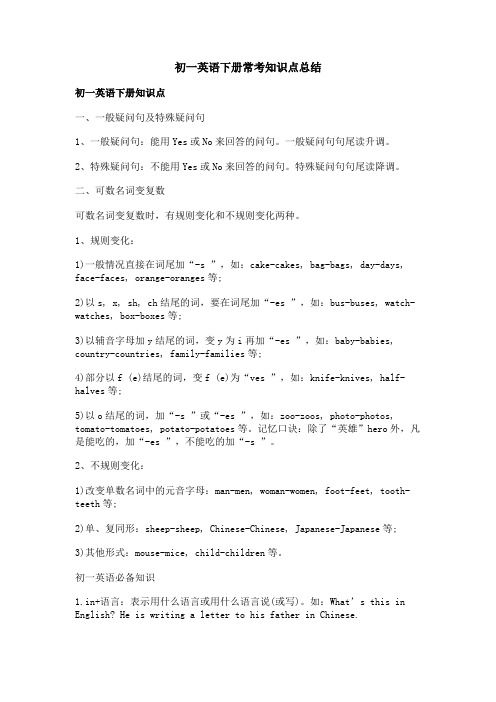
初一英语下册常考知识点总结初一英语下册知识点一、一般疑问句及特殊疑问句1、一般疑问句:能用Yes或No来回答的问句。
一般疑问句句尾读升调。
2、特殊疑问句:不能用Yes或No来回答的问句。
特殊疑问句句尾读降调。
二、可数名词变复数可数名词变复数时,有规则变化和不规则变化两种。
1、规则变化:1)一般情况直接在词尾加“-s ”,如:cake-cakes, bag-bags, day-days, face-faces, orange-oranges等;2)以s, x, sh, ch结尾的词,要在词尾加“-es ”,如:bus-buses, watch-watches, box-boxes等;3)以辅音字母加y结尾的词,变y为i再加“-es ”,如:baby-babies, country-countries, family-families等;4)部分以f (e)结尾的词,变f (e)为“ves ”,如:knife-knives, half-halves等;5)以o结尾的词,加“-s ”或“-es ”,如:zoo-zoos, photo-photos, tomato-tomatoes, potato-potatoes等。
记忆口诀:除了“英雄”hero外,凡是能吃的,加“-es ”,不能吃的加“-s ”。
2、不规则变化:1)改变单数名词中的元音字母:man-men, woman-women, foot-feet, tooth-teeth等;2)单、复同形:sheep-sheep, Chinese-Chinese, Japanese-Japanese等;3)其他形式:mouse-mice, child-children等。
初一英语必备知识1.in+语言:表示用什么语言或用什么语言说(或写)。
如:What’s this in English? He is writing a letter to his father in Chinese.2.in pairs意为“成双地”,“成对地”,“两人一组”。
初一下册英语知识点归纳
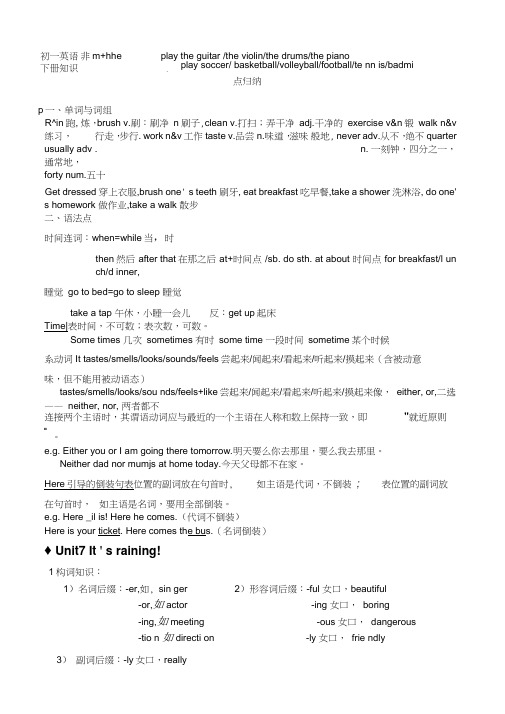
初一英语下册知识点归纳p 一、单词与词组R^in 跑, 炼,练习, usually adv .通常地,forty num.五十Get dressed 穿上衣服,brush one ' s teeth 刷牙, eat breakfast 吃早餐,take a shower 洗淋浴, do one' s homework 做作业,take a walk 散步二、语法点时间连词:when=while 当,时then 然后 after that 在那之后 at+时间点 /sb. do sth. at about 时间点 for breakfast/l unch/d inner,睡觉 go to bed=go to sleep 睡觉take a tap 午休,小睡一会儿 反:get up 起床Time|表时间,不可数;表次数,可数。
Some times 几次 sometimes 有时 some time 一段时间 sometime 某个时候系动词It tastes/smells/looks/sounds/feels 尝起来/闻起来/看起来/听起来/摸起来(含被动意 味,但不能用被动语态)tastes/smells/looks/sou nds/feels+like 尝起来/闻起来/看起来/听起来/摸起来像, either, or,二选—— neither, nor, 两者都不连接两个主语时,其谓语动词应与最近的一个主语在人称和数上保持一致,即 "就近原则 II。
e.g. Either you or I am going there tomorrow.明天要么你去那里,要么我去那里。
Neither dad nor mumjs at home today.今天父母都不在家。
Here 引导的倒装句表位置的副词放在句首时, 如主语是代词,不倒装 ; 表位置的副词放 在句首时, 如主语是名词,要用全部倒装。
初一英语知识点笔记下册
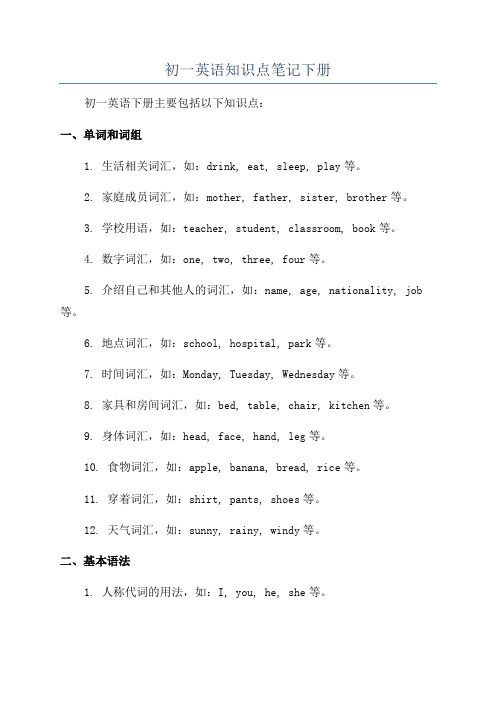
初一英语知识点笔记下册初一英语下册主要包括以下知识点:一、单词和词组1. 生活相关词汇,如:drink, eat, sleep, play等。
2. 家庭成员词汇,如:mother, father, sister, brother等。
3. 学校用语,如:teacher, student, classroom, book等。
4. 数字词汇,如:one, two, three, four等。
5. 介绍自己和其他人的词汇,如:name, age, nationality, job 等。
6. 地点词汇,如:school, hospital, park等。
7. 时间词汇,如:Monday, Tuesday, Wednesday等。
8. 家具和房间词汇,如:bed, table, chair, kitchen等。
9. 身体词汇,如:head, face, hand, leg等。
10. 食物词汇,如:apple, banana, bread, rice等。
11. 穿着词汇,如:shirt, pants, shoes等。
12. 天气词汇,如:sunny, rainy, windy等。
二、基本语法1. 人称代词的用法,如:I, you, he, she等。
2. 一般现在时的肯定句和否定句,如:I eat breakfast every morning. I don't drink coffee.3. 一般过去时的肯定句和否定句,如:I went to the park yesterday. I didn't watch TV last night.4. 一般将来时的肯定句和否定句,如:I will go to the beach tomorrow. I won't play basketball this weekend.5. 疑问句的构成,如:Do you like ice cream? Did she finish her homework?6. 介词的用法,如:in, on, at等。
初一下课英语知识点
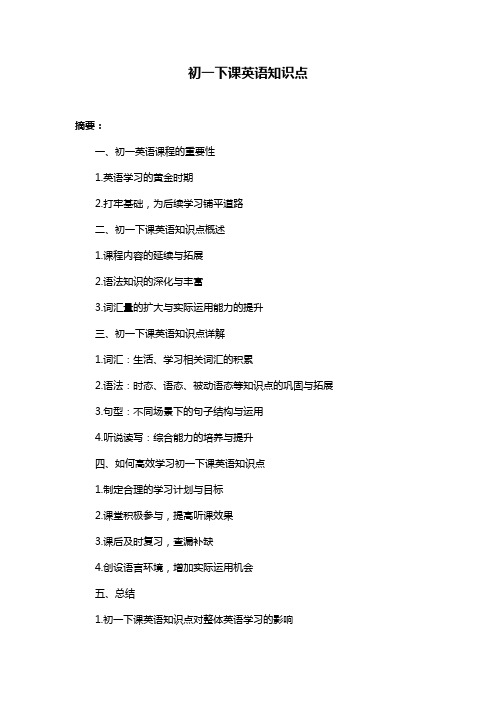
初一下课英语知识点摘要:一、初一英语课程的重要性1.英语学习的黄金时期2.打牢基础,为后续学习铺平道路二、初一下课英语知识点概述1.课程内容的延续与拓展2.语法知识的深化与丰富3.词汇量的扩大与实际运用能力的提升三、初一下课英语知识点详解1.词汇:生活、学习相关词汇的积累2.语法:时态、语态、被动语态等知识点的巩固与拓展3.句型:不同场景下的句子结构与运用4.听说读写:综合能力的培养与提升四、如何高效学习初一下课英语知识点1.制定合理的学习计划与目标2.课堂积极参与,提高听课效果3.课后及时复习,查漏补缺4.创设语言环境,增加实际运用机会五、总结1.初一下课英语知识点对整体英语学习的影响2.持续努力,不断提升英语水平正文:英语作为全球通用语言,在我国的基础教育阶段占有举足轻重的地位。
初一下学期的英语课程,是在初一下学期的基础上,对英语知识的进一步深化和拓展。
本文将对初一下课英语知识点进行概述和详解,并探讨如何高效学习这些知识点。
首先,我们要认识到初一英语课程的重要性。
初中阶段是英语学习的黄金时期,这个阶段的学生具有较强的好奇心和学习能力,对语言的掌握能力也最强。
因此,在初一阶段打下扎实的基础,对后续的英语学习有着至关重要的影响。
初一下课英语知识点涵盖了多个方面。
在课程内容上,它延续了上学期的话题,如家庭、学校、朋友等,并在此基础上进行了拓展。
在语法知识方面,它深化了时态、语态、被动语态等知识点的讲解。
此外,初一下课英语知识点还着重扩大了学生的词汇量,并强调实际运用能力的提升。
具体来说,初一下课英语知识点包括以下几个方面:1.词汇:课程中涉及了大量的生活、学习相关词汇,如日常生活用品、学科名称等。
掌握这些词汇有助于学生更好地理解和表达相关话题。
2.语法:课程对时态、语态、被动语态等知识点进行了巩固与拓展,帮助学生更好地运用英语进行描述和叙述。
3.句型:课程中包含了不同场景下的句子结构与运用,如疑问句、祈使句、感叹句等,使学生在不同语境下能够准确地表达自己的意思。
- 1、下载文档前请自行甄别文档内容的完整性,平台不提供额外的编辑、内容补充、找答案等附加服务。
- 2、"仅部分预览"的文档,不可在线预览部分如存在完整性等问题,可反馈申请退款(可完整预览的文档不适用该条件!)。
- 3、如文档侵犯您的权益,请联系客服反馈,我们会尽快为您处理(人工客服工作时间:9:00-18:30)。
初一英语(下)知识点一、第五单元1. The same to you! 表示你也一样。
当祝福你的人给你祝福时,用于回应对方。
Happy Children’s Day!The same to you!the sane to sb.表示某人也一样2.by +交通工具名称,表示使用某种交通方式,中间不加限定词,如果交通工具前有the, one’s等限定词时,介词不能用by,而用on或.in.注意: by引导的短语不能在句中作谓语,只能用作方式状语与动词go, come, get等连用.take the subway home乘地铁加家。
也可说成:go home by subway类似的有:ride a bike to school=go to school by bike 骑自行车去上学。
B\ by +交通工具,提问用how 引导的特殊疑问句. How do you usually c ome to school? 它是对交通方式的一个提问,通常用by bike, by train, by car ,b y bus, by plane/air, by ship/sea 等来回答.e.g.: How does your mother go to work? 你妈妈是怎样去上班的?She goe s to work by car .她开车去上班.How do you go toBeijing?你怎样去北京?4.频度副词频度副词是一般现在时的“标志词”,也是表示频度的副词。
这些词表示经常性动作或情况,而不是某一具体动作,常用于一般现在时。
这些频度副词在句子中的位置比较灵活,可以用于句首、句中或句末。
一般在句中位置有以下两种:1.在be动词、情态动词及第一个助动词之后,e.g. :She is seldom late for class. 她上课很少迟到。
My mother can never get up late.我妈妈从来不晚起。
2。
在实义动词(行为动词)之前,有时为了强调放在句首。
e.g.: He often reads books on weekends. 周末他经常看书。
Sometimes I g o to see my grandparents..有时我去看祖父母。
<一>A、always频度最高,表示动作重复,状态继续,中间没有间断,意为,频度副词,意为”一直,总是” 。
与never 对应。
如:I always get up early.我总是很早起床。
B、usually频度仅次于always,表示一般如此,很少例外,意思是”通常,一般”e.g.: Michael usually goes to school by bus.迈克尔通常乘公共汽车上学。
C、often频度又次于usually,表示动作重复,中间有间断,意为“经常”。
e.g. They often go swimming after school.他们放学后经常去游泳。
D、sometimes 频度又比often 小,表示动作偶尔发生,中间常有间断,意为“有时,不时”。
E.g.: Sometimes we take the subway to school.我们有进乘地铁上学。
E、seldom 表示动作偶尔发生,中间间断较多,其频度比sometimes更小。
E.g.: Jane seldom does her homework at school.简很少在学校做家庭作业。
F、never表示动作从不发生,其频度为零,意为“从不,从未”。
E.g.: That boy never eats meat .那个男孩儿从不吃肉。
由此可见,这些频度副词常与一般现在时连用,且频率大小依次为:always >usually>often>sometimes>seldom>never.另外,有时显了表示强调,也可放在句首或句末。
e.g.(1)Sometimes I go to the park with my parent’s .有时我和父母一起去公园。
(2)I go to the park with my parents sometimes.有时我和父母一起去公园。
(3)We always play games after class.我们下课后经常做游戏。
4)I seldom watch TV on weekdays.平日我很少看电视。
5)I usually study hard on weekdays and have a good rest on weekends.我通常在平日里努力学习,周末会好好休息一下。
<二>、how often多久一次,对频度提问,答语常用频度副词never, often, usually或单位时间内的次数。
Once a week 一周一次;twice a week 一周两次5. on foot=walk to6.the early bird catches the worm .早起的鸟儿有虫吃.也可说成”捷足先登”或”笨鸟先飞”.类似的还有:Two heads are better than one .两人智慧胜一人.7、very few 表示否定意思,很少的。
few 修饰可数名词,表示几乎没有;a few 表示几个,一些,后接可数名词的复数。
E.g.: a few apples几个苹果.littl e和a little修饰不可数名词。
E.g. :I have little water我几乎没水了。
(表示否定)。
I have a little water.我有一点儿水。
(表示肯定)。
8、have a short break稍作休息,这里的break为名词,相当于rest。
break 还可作动词用,有“打碎,破裂”的意思。
E.g.: She often breaks her glasses.她经常打碎她的眼镜。
9. go +v.- ing. 表示去做某事go swimming 去游泳go fishing去钓鱼go s hopping 去买东西go boating去划船go skating 去滑冰10、play basketball打蓝球,球类名称前不加任何冠词。
E.g.: play soccer 踢足球play the guitar/piano弹吉他./钢琴。
乐器名称前要加定冠词the.11 、play sports=do sports =do exercise做运动现在at the moment =now看电视watch TV看电影see a film看黑板look at the blackboard看书read a booklost and found 失物招领处12、for a little while一会儿,也可说成for a moment 如:Wait for a mo ment稍等一会儿。
13、She is reading in the library.她在图书馆看书。
reading是read的现在分词,助动词be(is ,am, are)+现在分词构成现在进行时。
E.g.: We are listening to the teacher.我们中听老师讲课。
另外要注意动名词和现在分词同形,在学习进要特别注意。
如:She like reading best.此句中的reading 在这里是read的动名词。
B、对现在进行时中的谓语和宾语提问时用“What---doing?”e.g. What are you doing now? 你现在在做什么?What is he doing? He is watching TV.他在干什么?了在看电视。
14、英语中怎样借东西可用一句旅顺来概括“借进(borrow)借出(lend)借多久(keep)。
表示借多长时间时要用持续性动词keep,意为“保存,保留”。
向某人借某物borrow sth. from sb. e.g.: May I borrow a pen from you?我可以向你借友钢笔吗?把某物借给某人lend sb. sth. (lend sth. to sb.) e.g.: I can lend you a pen.我可以借给你一支钢笔。
15、归还,return,可以用give back来表达。
把某物还给某人:return sth.(to sb.)=give sth. back to sb.e.g.: Please return the book to me now.=Please give the book back to me now.请现在把书给我。
16、on time准时,按时,强调不早也不迟。
in time 及时,强调在规定时间之前以不迟到为标准。
e.g. We must get to school on time.我们必须按时到校。
The doctor got there in time ,and saved his life.医生及时赶到了那儿,挽救了他的生命。
17、It`s a pleasure 别客气,不用谢。
这是回答感谢的客套话。
类似的短语还有:Not at all ./My pleasure. / That’s all right. / That’s OK.等。
18、look for寻找,强调动作,look find找到、发现,强调结果。
e.g. I am looking for my pen everywhere but I can not find it .我在到处找我的钢笔但我找不到。
19、else 别的,放在不定代词something, anything, nothing, somebody, any body, nobody和疑问词who, what, where等后面。
E.g. I can’t see anybody else in the room.我没看见其他人在房间里。
20、in the center of 在―――中央(心),相当于in the middle of .in the middle of 还可指“在―――(时间)的中间”e.g. I will go to Beijing in the middle of March .三月中旬我要去北京。
on the corner of 在----拐角外at the corner of 表示在某一地方或某建筑物外面的拐角处,因此on the co rner of 和at the corner of 有时可以互换。
in the corner of 表示“在某一建筑物内的角落”。
